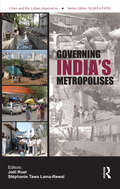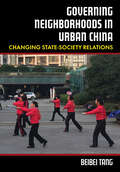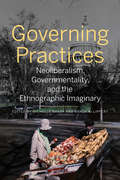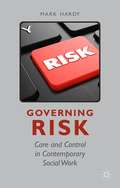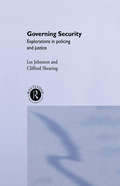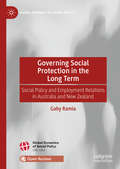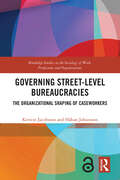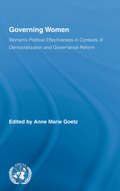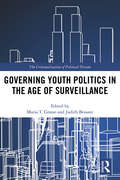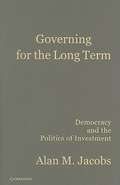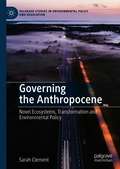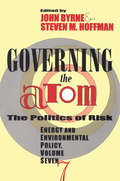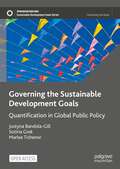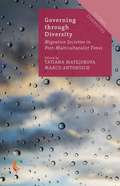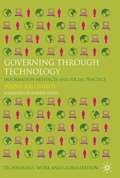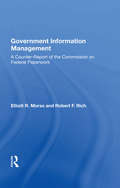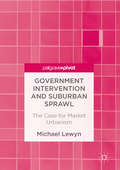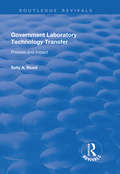- Table View
- List View
Governing India's Metropolises: Case Studies of Four Cities (Cities and the Urban Imperative)
by Stéphanie Tawa Lama-Rewal Joël RuetThis book is a comparative, sector-based study of the changing character of governance in Indian metropolises in the 2000s. Highlighting the horizontal and vertical ties of the participatory groups, both state and non-state, it looks at key civic issues.
Governing Indigenous Territories: Enacting Sovereignty in the Ecuadorian Amazon
by Erazo Juliet S.Governing Indigenous Territories illuminates a paradox of modern indigenous lives. In recent decades, native peoples from Alaska to Cameroon have sought and gained legal title to significant areas of land, not as individuals or families but as large, collective organizations. Obtaining these collective titles represents an enormous accomplishment; it also creates dramatic changes. Once an indigenous territory is legally established, other governments and organizations expect it to act as a unified political entity, making decisions on behalf of its population and managing those living within its borders. A territorial government must mediate between outsiders and a not-always-united population within a context of constantly shifting global development priorities. The people of Rukullakta, a large indigenous territory in Ecuador, have struggled to enact sovereignty since the late 1960s. Drawing broadly applicable lessons from their experiences of self-rule, Juliet S. Erazo shows how collective titling produces new expectations, obligations, and subjectivities within indigenous territories.
Governing Mobility Beyond the State: Centre, Periphery and the EU's External Borders (Palgrave Studies in European Political Sociology)
by Andreas MüllerThis book explores the structural tensions and conflicts that arise with the abolition of border controls between the EU's member states and how this conflict ridden relationship affects and is affected by the institutional shape of the EU's external borders.
Governing Neighborhoods in Urban China: Changing State-Society Relations
by Beibei TangGoverning Neighborhoods in Urban China examines the key mechanisms operating at the grassroots level in China that contribute to urban development and increased public support for the legitimacy and authority of the Chinese state. Beibei Tang uncovers new trends and dynamics of urban neighborhood governance since the 2000s to reveal the significant factors that contribute to regime survival. Tang introduces the concept of hybrid authoritarianism, a governance mechanism an authoritarian state employs to produce governance legitimacy, public support, and regime sustainability. Hybrid authoritarianism is situated in an intermediary governance space between state and society. It accommodates both state and non-state actors, deals with a wide range of governance issues, employs flexible governance strategies, and in this context, ultimately strengthens CCP leadership. Tang documents processes of hybrid authoritarianism through her focus on various types of urban neighborhoods, including new urban middle-class neighborhoods, and the increasing urbanization of the countryside. Governing Neighborhoods in Urban China provides a conceptual framework that avoids scholarly approaches that tend to reify either one-party autocracy or Western-centric notions of democracy.
Governing Police Stops Across Europe (Palgrave's Critical Policing Studies)
by Elizabeth Aston Mike Rowe Genevieve Lennon Sofie De Kimpe János FazekasThis book takes a critical and comparative approach to the analysis of the governance of police stops across Europe. It draws on an EU COST Action research network on Police Stops which engaged academics and practitioners from 29 countries to better understand the practice of police stops. It begins by examining how police stops are defined and the various legal rules and levels of accountability afforded. The chapters are arranged by theme to focus on a core aspect of the governance of police stops. These include: legal frameworks and police discretion; internal governance; external accountability and civilian oversight; possibilities for legal recourse; and the different roles of data and technology. Each compares the distinct approaches evident across Europe, often employing case studies. The book adopts a critical approach, acknowledging governance as contested and involving diverse (state, non-state and supranational) actors. It considers implications for policing in a rapidly changing environment globally.
Governing Practices: Neoliberalism, Governmentality, and the Ethnographic Imaginary
by Randy K. Lippert Michelle BradyNeoliberalism is among the most commonly used concepts in the social sciences. Furthermore, it is one of the most influential factors that have shaped the formation of public policy and politics. In Governing Practices, Michelle Brady and Randy Lippert bring together prominent scholars in sociology, criminology, anthropology, geography, and policy studies to extend and refine the current conversation about neoliberalism. The collection argues that a new methodological approach to analyzing contemporary policy and political change is needed. United by the common influence of Foucault's governmentality approach and an ethnographic imaginary, the collection presents original research on a diverse range of case studies including public-private partnerships, the governance of condos, community and state statistics, nanopolitics, philanthropy, education reform, and pay-day lending. These diverse studies add considerable depth to studies on governmentality and neoliberalism through a focus on governmental practices that have not previously been the focus of sustained analysis.
Governing Risk
by Mark HardyDrawing on Foucault's later work on governmentality, this book traces the effects of 'the rise of risk' on contemporary social work practice. Focusing on two 'domains' of practice mental health social work and probation work it analyses the ways in which risk thinking has affected social work's aims and objectives, methods and approaches. It critically interrogates the claim that the logic of actuarialsim is implicated in a shift from 'care' to 'control' and argues the case for a distinctive approach to understanding and undertaking social work which does justice to the reality of contemporary practice. "
Governing Security: Explorations of Policing and Justice
by Les Johnston Clifford D. ShearingGovernment has been radically transformed over the past few decades. These transformations have been mirrored in, and often prefigured by, changes in the governance of security - mentalities, institutions, technologies and practices used to promote secure environments. This book traces the nature of these governmental changes by looking at security. It examines a variety of related questions, including:* What significant changes have occurred in the governance of security? * What implications do these changes have for collective life? * What new imaginings may be needed to reshape security? * What ethical factors need to be considered in formulating such new imaginings?The authors conclude bringing together descriptive, explanatory and normative considerations to access how justice can be conceived within the governance of security.
Governing Social Protection in the Long Term: Social Policy and Employment Relations in Australia and New Zealand (Global Dynamics of Social Policy)
by Gaby RamiaThis open access book examines the comparative evolution of social protection in Australia and New Zealand from 1890 to the present day, focusing on the relationship between employment relations and social policy. Utilising longstanding and more recent developments in historical institutionalist methodology, Ramia investigates the relationship between these two policy domains in the context of social protection theory. He argues that treating employment relations as dynamic, and as inextricably intertwined with changes in the welfare state over time, allows for more accurate portrayal of similarity and difference in social protection. The book will be of most interest to researchers, advanced undergraduate and postgraduate students in social policy, employment relations, public policy, social and political history, and comparative politics.
Governing Street-Level Bureaucracies: The Organizational Shaping of Caseworkers (Routledge Studies in the Sociology of Work, Professions and Organisations)
by Håkan Johansson Kerstin JacobssonThis book examines how caseworkers are governed in today’s street-level bureaucracies. It redefines our understanding of public sector governance by highlighting the subtle, informal, and everyday forms of organizational governance that shape caseworkers’ subjectivities beyond formal policies and professional identities. Based on four distinct types of normative governance – ‘governance by discourse’, ‘governance by emotions’, ‘governance by peers’, and ‘governance by numbers, colours, and symbols’, the book shows how caseworkers are shaped as organizational staff members alongside their roles as welfare professionals and welfare state bureaucrats. Governing Street-Level Bureaucracies will be of interest to scholars and students in organizational sociology, street-level bureaucracy research, public administration, and critical management studies. It also provides valuable insights for policymakers and practitioners seeking to understand caseworkers’ responses to public governance and public sector reforms.
Governing The Press: Media Freedom In The U.s. And Great Britain
by Deborah HolmesJealously guarded and frequently defended, the concept of freedom of the press is still subject to widely varying interpretations in different democratic systems. This book compares and contrasts the ways in which the system limits and defines press freedom in two nations known for an unfettered press-the United States and Great Britain. Examining
Governing Women: Women’s Political Effectiveness in Contexts of Democratization and Governance Reform (Routledge/UNRISD Research in Gender and Development)
by Anne Marie GoetzThough the proportion of women in national assemblies still barely scrapes 16% on average, the striking outliers - Rwanda with 49% of its assembly female, Argentina with 35%, Liberia and Chile with new women presidents this year - have raised expectations that there is an upward trend in women's representation from which we may expect big changes in the quality of governance. But getting women into public office is just the first step in the challenge of creating governance and accountability systems that respond to women's needs and protect their rights. Using case studies from around the world, the essays in this volume consider the conditions for effective connections between women in civil society and women in politics, for the evolution of political party platforms responsive to women's interests, for local government arrangements that enable women to engage effectively, and for accountability mechanisms that answer to women. The book's argument is that good governance from a gender perspective requires more than more women in politics. It requires fundamental incentive changes to orient public action and policy to support gender equality.
Governing Youth Politics in the Age of Surveillance (The Criminalization of Political Dissent)
by Judith Bessant Maria T. GrassoDrawing on case studies from around the world, contributors to this ground-breaking book explore a major contemporary paradox: on the one hand, young people today are at the forefront of political campaigns promoting social rights and ethical ideas that challenge authoritarian orders and elite privileges. On the other hand, too many governments, some claiming to be committed to liberal-democratic values, social inclusion and youth participation are engaged in repressing political activities that contest the status quo. Contributors to this book explore how, especially since 9/11, governments, state agencies and other traditional power holders around the globe have reacted to political dissent authored by young people. While the ‘need’ to enhance ‘youth political participation’ is promoted, the cases in this book document how states are using everything from surveillance, summary offences, expulsion from universities, ‘gag laws’ and ‘antiterrorism’ legislation, and even imprisonment to repress certain forms of young people’s political activism. These responses diminish the public sphere and create civic spaces hostile to political participation by any citizen. This book forms part of The Criminalization of Political Dissent series. It documents and interprets the many ways contemporary governments and agencies now routinely use various techniques to repress and criminalise political dissent.
Governing by Numbers and Human Capital in Education Policy Beyond Neoliberalism: Social Democratic Governance Practices in Public Higher Education (Educational Governance Research #19)
by Miriam MadsenThis book addresses governing by numbers and human capital policy in higher education by asking how higher education is quantified, how the quantitative information is used in educational governance, and how the information is perceived by students, teachers, managers, and policymakers, and affects decision-making. It also thematically discusses how human capital theory affects the quantification practices and, thereby, their effects. Based on these analyses, the book asks whether governing by numbers and human capital in education policy are necessarily neoliberal practices, and thus questions the theory of global convergence in educational governance.The book provides a thorough analysis of the quantification of graduate outcomes based on the philosophical framework of Agential Realism, thus offering a novel analytical approach to the study of data and indicators in educational governance. The book draws on a comprehensive ethnographic case study from Danish higher education, and relates the findings from this case study to empirical cases in other countries and international research in the field. The book brings together literature from various fields, including political science, accounting, education, and sociology of quantification, in order to provide a comprehensive account of how quantification practices affect education.
Governing for the Long Term
by Alan M. JacobsIn Governing for the Long Term, Alan M. Jacobs investigates the conditions under which elected governments invest in long-term social benefits at short-term social cost. Jacobs contends that, along the path to adoption, investment-oriented policies must surmount three distinct hurdles to future-oriented state action: a problem of electoral risk, rooted in the scarcity of voter attention; a problem of prediction, deriving from the complexity of long-term policy effects; and a problem of institutional capacity, arising from interest groups' preferences for distributive gains over intertemporal bargains. Testing this argument through a four-country historical analysis of pension policymaking, the book illuminates crucial differences between the causal logics of distributive and intertemporal politics and makes a case for bringing trade-offs over time to the center of the study of policymaking.
Governing the Anthropocene: Novel Ecosystems, Transformation and Environmental Policy (Palgrave Studies in Environmental Policy and Regulation)
by Sarah ClementThis book focuses on the present and future challenges of managing ecosystem transformation on a planet where human impacts are pervasive. In this new epoch, the Anthropocene, the already rapid rate of species loss is amplified by climate change and other stress factors, causing transformation of highly-valued landscapes. Many locations are already transforming into novel ecosystems, where new species, interactions, and ecological functions are creating landscapes unlike anything seen before. This has sparked contentious debate not just about science, but about decision-making, responsibility, fairness, and human capacity to intervene. Clement argues that the social and ecological reality of the Anthropocene requires modernised governance and policy to confront these new challenges and achieve ecological objectives. There is a real opportunity to enable society to cope with transformed ecosystems by changing governance, but this is notoriously difficult. Aimed at anyone involved in these conversations, be those researchers, practitioners, decision makers or students, this book brings together diffuse research exploring how to confront institutional change and ecological transformation in different contexts, and provides insight into how to translate governance concepts into productive pathways forward.
Governing the Atom (Politics Of Risk Energy Policy Studies #Vol. 7)
by John Byrne Steven M. HoffmanPromoted as a form of limitless, low-cost energy without the polluting effects of Its fossil fuel counterparts, nuclear power has enjoyed unparalleled support in several countries. Despite the development of an extensive set of policy and institutional mechanisms to foster its use. nuclear technology has been troubled by a wide range of problems and continues to pose risks many believe are far greater than society should accept. The legacy of failure ranges from catastrophic accidents like that at Chernobyl to the declaration of bankruptcy by the Washington Public Power Supply System. Governing the Atom explores why support for the technology remains substantial. The first part of this volume examines the social institutions that have accompanied the development of nuclear power. The second part details the numerous accommodations which have been required of society, beginning with the technology’s Impact on communities and geographic regions particularly affected by mining and milling. The technology’s inherent tendency towards "normal accidents” and the conflict between expert and public opinion on the dangers involved is examined, as are the on-going problems of waste disposal and decommissioning. The volume concludes with an examination of nuclear power developments in France, Germany. Russia and the Commonwealth of Independent States. Eastern Europe, Korea, and Japan. The volume provides a needed vehicle for the timely consultation and dissemination of current research on important energy policy issues. Governing the Atom provides insightful commentary regarding the initiation and development of nuclear technology. It will be of interest to policymakers, energy and environmental experts, sociologists and historians of technology, and all those interested in the problem of democracy in a technological society.
Governing the Future: Digitalization, Artificial Intelligence, Dataism (CRC Press Reference Books in Computer Science)
by Henning Glaser Pindar WongWe are living in times of deep and disruptive change. Perhaps the most powerful vector of this change can be described by three related catchphrases: digitalization, artificial intelligence, and dataism. Drawing on considerable expertise from a wide range of scholars and practitioners, this interdisciplinary collection addresses the challenges, impacts, opportunities and regulation of this civilizational transformation from a variety of angles, including technology, philosophy, cultural studies, international law, sociology and economics. This book will be of special interest to scholars, students, analysts, policy planners, and decision-makers in think tanks, international organizations, and state agencies studying and dealing with the development and governance of disruptive technologies.
Governing the Sustainable Development Goals: Quantification in Global Public Policy (Sustainable Development Goals Series)
by Sotiria Grek Justyna Bandola-Gill Marlee TichenorThis open access book conceptualises the Sustainable Development Goals as epistemic infrastructures that connect numbers, networks and governing paradigms.The book approaches quantification not merely as a tool for governing, but rather as a broader epistemic system through which global public policy is produced. This book focuses on the role of international organisations in shaping and implementing the 2030 Agenda and demonstrates how the SDGs have transformed and accelerated trends in quantification.
Governing the Urban in China and India: Land Grabs, Slum Clearance, and the War on Air Pollution (Princeton Studies in Contemporary China #10)
by Xuefei RenAn in-depth look at the distinctly different ways that China and India govern their cities and how this impacts their residentsUrbanization is rapidly overtaking China and India, the two most populous countries in the world. One-sixth of humanity now lives in either a Chinese or Indian city. This transformation has unleashed enormous pressures on land use, housing, and the environment. Despite the stakes, the workings of urban governance in China and India remain obscure and poorly understood.In this book, Xuefei Ren explores how China and India govern their cities and how their different styles of governance produce inequality and exclusion. Drawing upon historical-comparative analyses and extensive fieldwork (in Beijing, Guangzhou, Wukan, Delhi, Mumbai, and Kolkata), Ren investigates the ways that Chinese and Indian cities manage land acquisition, slum clearance, and air pollution. She discovers that the two countries address these issues through radically different approaches. In China, urban governance centers on territorial institutions, such as hukou and the cadre evaluation system. In India, urban governance centers on associational politics, encompassing contingent alliances formed among state actors, the private sector, and civil society groups. Ren traces the origins of territorial and associational forms of governance to late imperial China and precolonial India. She then shows how these forms have evolved to shape urban growth and residents’ struggles today.As the number of urban residents in China and India reaches beyond a billion, Governing the Urban in China and India makes clear that the development of cities in these two nations will have profound consequences well beyond their borders.
Governing through Diversity: Migration Societies In Post-multiculturalist Times (Global Diversities)
by Marco Antonsich Tatiana MatejskovaThis cross-disciplinary edited collection presents an integrated approach to critical diversity studies by gathering original scholarly research on ideational, technical and actual social dimensions of contemporary governance through diversity.
Governing through Technology
by Jannis KallinikosInformation produced and disseminated by an interlocking ecology of computer-based systems and artifacts currently provides the essential means for planning organizational operations and controlling organizational performances. This book describes the vital importance that digital information acquires in restructuring organizations.
Government Information Management: A Counterreport Of The Commission On Federal Paperwork
by Elliott R. MorssIn this timely critique of federal procedures, the authors identify the underlying causes of the current overload of information/paper-work in government and explain why the problem cannot be controlled until the causes are eliminated or neutralized. Using a calcuius they have developed for estimating the "value and "burden of federal information,
Government Intervention and Suburban Sprawl
by Michael LewynThis book shows how suburban sprawl is at least partially a consequence of government spending and regulation, and suggests anti-sprawl policies that can make government smaller and/or less intrusive. Thus, the book responds to the widely held view that automobile-dependent suburban development (also known as "suburban sprawl") is a natural result of the free market and of affluence, and accordingly cannot be altered without massive government regulation.
Government Laboratory Technology Transfer: Process and Impact (Routledge Revivals)
by Sally A RoodThis title was first published in 2000: Due to budget cuts and competitiveness pressures, determining the outcome of technology transfer from government R&D laboratories to private industry and entrepreneurial start-ups is of increasing interest. This book presents a series of case studies of successful technology transfer by examining the same list of topics for each case. It presents a format for analyzing the cases, topic by topic - a methodology that could be used by any R&D laboratory. The book also goes one step further and compares the cases that took place prior to national technology transfer legislation with those cases that took place after passage of such legislation. An additional feature is the summary of existing attempts to measure and evaluate technology transfer. This follows a backgroudn section on the technology policy context. The analysis finds that there is a significant commercial impact from government laboratory transfer using this approach.
